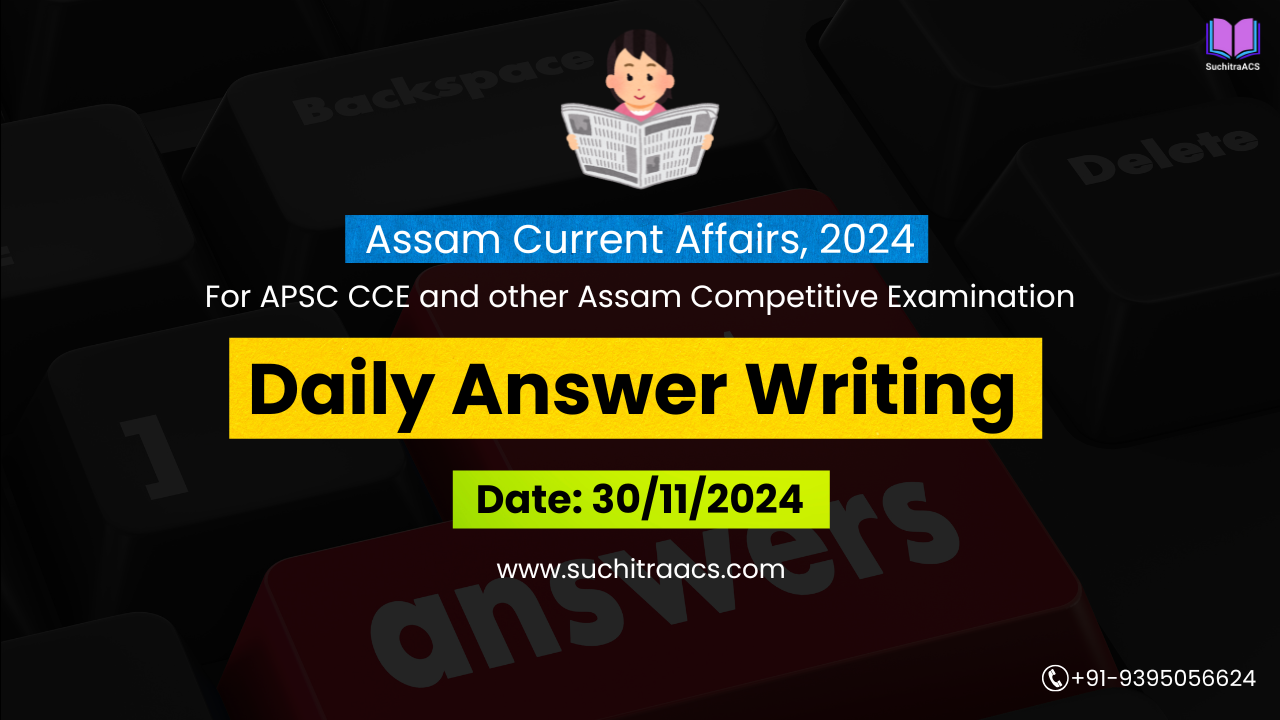APSC Answer Writing (Daily) based on Assam Tribune – 30/11/2024
For APSC CCE and other Assam Competitive examinations aspirants, practicing Daily Answer Writing is vital. This blog covers the most important Main question and its model Answer from the Assam Tribune today (30-11-2024).
Topic: COP-29 Summit Outcomes and Relevance for India
GS Paper 3: Environment, Climate Change
The COP-29 Summit in Baku highlighted the urgency of global climate action but revealed significant disparities in commitments between developed and developing nations. Critically analyze the implications of COP-29 outcomes for India’s climate policy, energy transition, and global leadership. Suggest measures India can adopt to balance its developmental needs with its climate commitments.
Model Answer
Introduction:
The COP-29 Summit underscored the importance of enhancing climate finance, operationalizing carbon markets, and transitioning away from coal to mitigate climate change. For India, which balances rapid development with ambitious climate goals, the outcomes of COP-29 present both challenges and opportunities to strengthen its global climate leadership.
Implications for India:
- Climate Policy:
- India’s commitment to achieving net-zero emissions by 2070 aligns with global climate targets but requires recalibrating its policy frameworks.
- The focus on carbon trading can incentivize investments in renewable energy projects.
- Energy Transition:
- The “no new coal” policy challenges India’s reliance on coal for energy security.
- Expanding renewable energy infrastructure is crucial to achieving 50% non-fossil energy capacity by 2030.
- Global Leadership:
- India’s role in the International Solar Alliance (ISA) and commitments to green hydrogen make it a significant player in shaping global energy strategies.
- Advocacy for climate finance can bridge the divide between the Global North and South.
Challenges:
- Insufficient Climate Finance:
- The $300 billion pledged falls short of the $1.3 trillion demanded by developing nations, limiting India’s ability to scale renewable projects.
- Coal Dependency:
- India faces challenges in phasing out coal due to its role in energy security and employment.
- Technology Gaps:
- Dependence on developed nations for green technology and intellectual property rights remains a constraint.
- Equity Concerns:
- The principle of “Common but Differentiated Responsibilities” (CBDR) is under strain due to uneven contributions to emissions reductions.
Measures for Balancing Development and Climate Commitments:
- Promoting Renewable Energy:
- Accelerate investments in solar, wind, and hydroelectric projects through public-private partnerships.
- Expand the National Hydrogen Mission to create alternative energy pathways.
- Leveraging Carbon Markets:
- Establish a robust domestic carbon trading framework to align with COP-29 outcomes.
- Climate Finance Advocacy:
- Strengthen negotiations for higher financial commitments from developed nations.
- Mobilize resources through multilateral platforms like the Green Climate Fund (GCF).
- Technology and Innovation:
- Foster indigenous R&D in green technologies to reduce reliance on external support.
- Incentivize startups and industries working in clean energy and climate resilience.
- Global Cooperation:
- Strengthen partnerships under ISA and G20 presidency to amplify the voice of the Global South.
Conclusion:
COP-29 outcomes reaffirm the urgency of climate action but expose significant disparities in global commitments. For India, navigating these challenges requires integrating sustainable development with inclusive growth. By leveraging its leadership in renewable energy and advocating for equitable climate finance, India can emerge as a key architect of global climate solutions while meeting its developmental aspirations.
✨ Looking for top-quality APSC Mains Guidance with Personalised Mentor?

🔔 Join Our WhatsApp Study Group!
For exclusive access to premium quality content, including study materials, current affairs, MCQs, and model answers for APSC CCE and other Assam competitive exams.
Click here to join: SuchitraACS Study WhatsApp Group
📚 Want to know more about SuchitraACS’s most affordable courses?
Click here to know more: SuchitraACS Courses for APSC CCE and Assam Competitive Examinations




